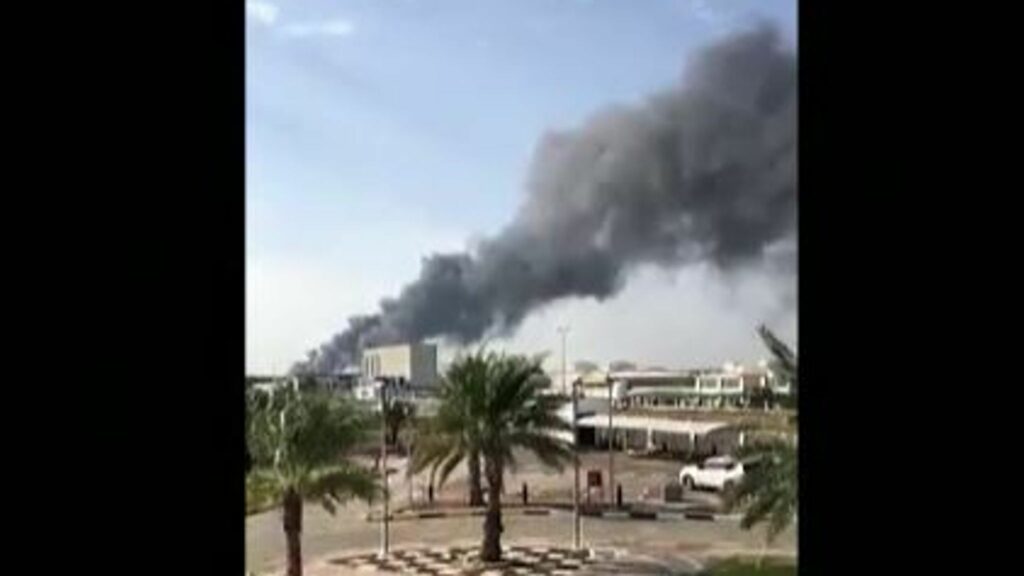Manas Dasgupta
NEW DELHI, Jan 17: Three people including two Indian nationals and the third one reported to be a Pakistani, were killed and six wounded in a suspected drone attack that blew up three fuel trucks causing a huge fire near a major oil storage facility in the United Arab Emirates Abu Dhabi airport on Monday.
Though there was no immediate official confirmation, but Yemen’s Iran-aligned Houthi group was believed to be behind the explosion. The Houthi group claimed that it had launched an attack deep inside the United Arab Emirates.
The Houthi movement, which is battling a Saudi-led coalition that includes the UAE, has frequently launched cross-border missile and drone attacks on Saudi Arabia, but has claimed few such attacks on the UAE, mostly denied by Emirati authorities.
Footage on social media showed a thick plume of black smoke billowing from what appeared to be the Musaffah area.
“Initial investigations found parts of a small plane that could possibly be a drone at both sites that could have caused the explosion and the fire,” Abu Dhabi police said in a statement, adding there was no “significant damage.”
The Houthi’s military spokesman said the group launched a military operation “deep in the UAE” and would announce details in coming hours. The UAE authorities did not immediately issued any comment.
“We have heard from the authorities here that two Indians died,” India’s envoy to the UAE Sunjay Sudhir said. “We are trying to find out their identities. We will reach out to their families… Stay calm. The UAE is a very peaceful place,” Sudhir said.
Earlier, local media had reported that three fuel tanks exploded near depots of Abu Dhabi National Oil Company, but the cause was not immediately known.
The incident in Abu Dhabi comes just days after a UAE ship was seized by the Houthis. The United Nations Security Council has condemned the seizure and demanded immediate release of the vessel and crew.
Yemen has been engulfed in a conflict between government forces led by President Abdrabbuh Mansour Hadi, and the Houthi rebels. Since March 2015, a Saudi-led Arab alliance working with Hadi’s forces has been conducting air, land and sea operations against the Houthis.
The Saudi-led coalition believes the use by Houthi forces of two ports as military bases would turn them into legitimate military targets, coalition spokesman Brigadier General Turki al-Malki said last week. The ports of Hodeidah and Salif are controlled by Yemen’s Iran-aligned Houthi movement and which the Saudi-led coalition has said uses them as launching points for missiles, drones and marine operations.
However, air and sea access to Houthi-held areas is controlled by the Saudi-led coalition, that intervened in Yemen in early 2015 after the movement ousted the internationally recognised government from the capital Sanaa.
Pro-coalition Yemeni forces backed by the UAE recently joined fighting against the Houthis in Yemen’s energy-producing regions of Shabwa and Marib. The UAE had largely scaled down its military presence in Yemen in 2019 amid a military stalemate and heightened regional tensions with Iran, but continues to hold sway through Yemeni forces it armed and trained.
The Houthis, who ousted the internationally recognised government from the capital, Sanaa, in late 2014, prompting the coalition to intervene, have said their growing military capabilities would allow the group to target the UAE.
In July 2018, the UAE denied reports that the Houthis attacked Abu Dhabi airport with a drone. A month later, Dubai International Airport said it was operating as normal after Houthi-run media said the group launched a drone attack there.
In December 2017, the Houthis said they fired a cruise missile towards a nuclear power plant in Abu Dhabi, which Emirati authorities denied.

